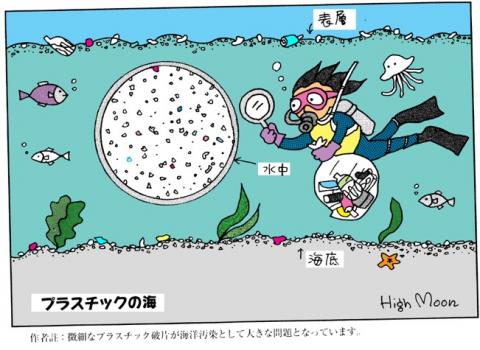Circular Economy Approaches to Eliminate Plastic Waste
In collaboration with scientists and economists at the University of Cambridge, Dr Brigitte Steger (Japanese Studies) and her colleagues have been awarded a £1m grant by UK Research and Innovation (UKRI) to study ‘Circular Economy Approaches to Eliminate Plastic Waste’. Commencing in January 2019, the project aims to contribute towards the development of a sustainable plastics economy by examining the local and global distributions of plastics, providing innovative alternatives to plastics and developing novel technologies for the utilisation of waste plastics. The 18-month award will also help to establish a ‘Cambridge Centre for Creative Circular Economy Approaches to Eliminate Plastic Waste’. The project is led by Professor Erwin Reisner (Chemistry) with Dr Steger heading one of the four Work Packages: ‘Waste and Management: The Circular Economy, Consumers’ Agency and Incentivising Behavioural Change’. Dr Steger will also act as the Social and Policy Impact Leader of the project.
Dr Steger’s sub-project is described below:
Cleanliness, Convenience and Propriety: Plastic and Waste in Consumer Societies
Principle Investigator: Dr Brigitte Steger, Faculty of Asian and Middle Eastern Studies (Japanese Studies)

'Sea of Plastic’, manga by High Moon (curtesy Hiroshi Takatsuki, Miyako Ecology Centre, Kyoto)
This project investigates how the use and disposal of plastic are embedded in the everyday lives of consumers. It asks how people’s plastic use and recycling habits are influenced by the legal and procedural systems of waste collection/recycling and their own personal values, lifestyles and understanding of natural and social environments. Plastic is an extremely useful and hygienic material for storing food, domestic cleaning products and many other household items; at the same time, there is growing awareness and concern about the tons of plastic waste that are dumped into the environment and often enter the food chain. Consequently, the use of plastic creates conflicting notions of cleanliness, convenience and propriety for consumers.
Using ethnographic methods, this anthropological project examines how waste disposal and recycling rules (with a focus on plastic) influence people’s behaviour and views on cleanliness and the environment; it also examines people’s agency in this matter and how they classify plastic and negotiate social relationships through plastic and waste related activities. Three cases with different social and cultural background as well as different approaches to plastic use and recycling will be investigated: Japan, Uruguay (tbc) and the UK.
Japan is a country with an elaborate packaging culture and abundant use of plastic in everyday consumer life; equally, the waste-sorting and recycling systems are highly sophisticated and demand a high degree of involvement from consumers and (private) neighbourhood associations. Through the study of waste-related activities, Steger is keen to study how people’s personal philosophies affect their approach and behaviour with regard to consumer goods (mono), their environment and their fellow citizens; she will pay particular attention to ideas of cleanliness, convenience, propriety and the concept of mottainai (a sense of regret associated with wasting time, money and physical objects). Following fieldwork in various regions of Japan in autumn 2018, she plans a second trip during the academic year 2019/20.
Uruguay, in contrast, is a country with relatively high levels of recycling due to the activity of waste-pickers in the informal sector but low levels of household separation of waste and formal-sector recycling. Since 2014, however, four recycling plants have been built in the capital, Montevideo, partly financed by a packaging law (Ley de Envases) that relies on voluntary contributions to the Chamber of Commerce by importers and producers of packaging materials. These plants have brought with them an infrastructure that includes kerb-side containers for recyclables, thus partly shifting the onus for separation from the waste-picker to the consumer. The postdoctoral researcher will turn her or his attention to household separation in Montevideo in order to understand how new recycling infrastructures are changing household waste disposal practices.
The focus of our study within the UK will be on Cambridgeshire and will be carried out in collaboration with the RECAP network (Recycle for Cambridgeshire and Peterborough). A programme of mixed-method qualitative research will examine the factors influencing citizen participation in household plastic separation, including questions of time, costs, hygiene and recycling options. The aim of this project is to shed light on the use of plastic from the perspective of the consumer: by understanding people’s cleanliness practices, how packaging affects their shopping habits and what meaning people ascribe to their behaviour, we aim to draw practical conclusions about how consumers can be educated to reduce and recycle plastic waste.
